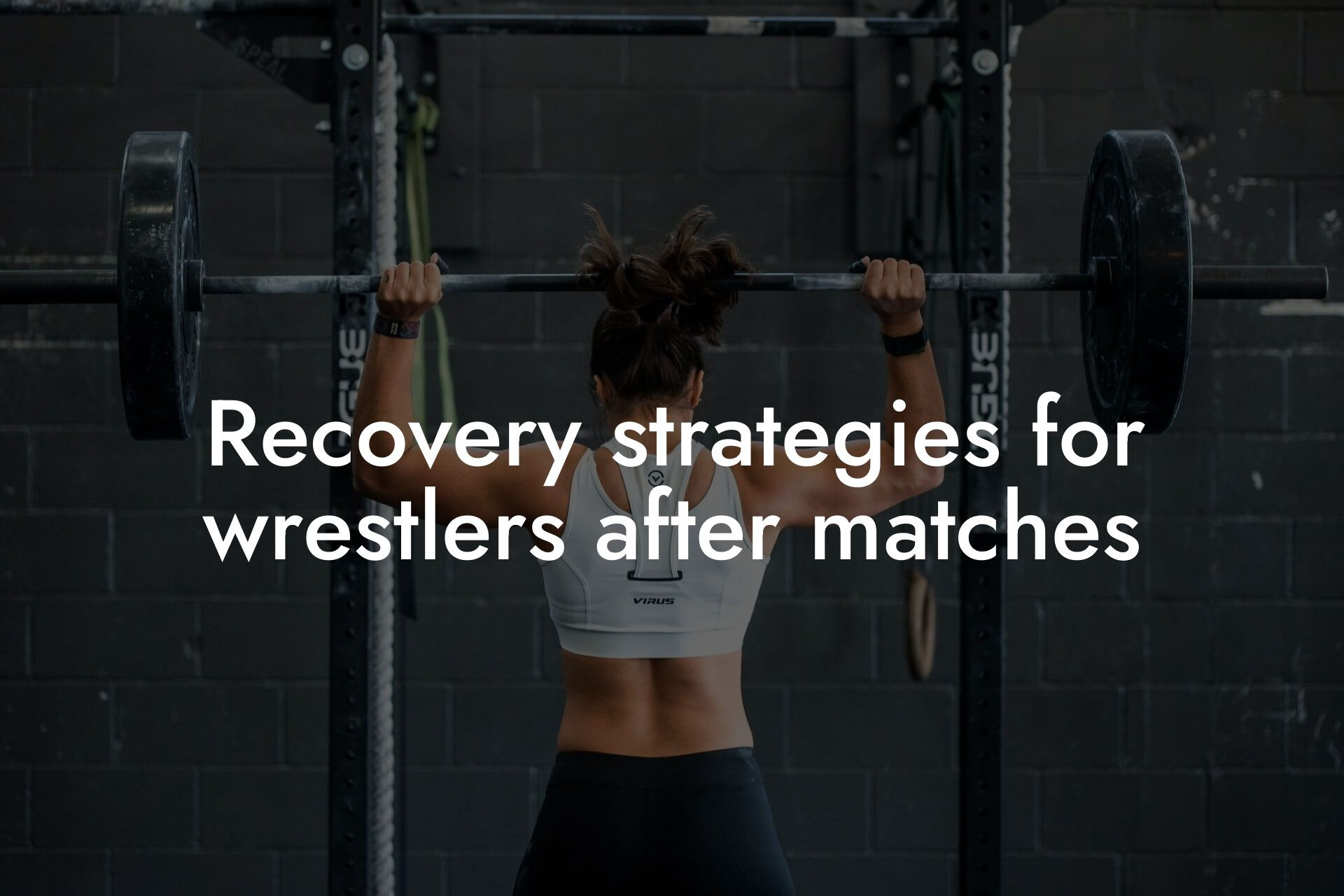As a wrestler, you understand the importance of maintaining muscle mass while cutting weight to reach your desired weight class. This delicate balance requires a deep understanding of nutrition and how it affects your body. In this article, we'll provide you with comprehensive nutrition tips to help you achieve your goals and optimize your performance on the mat.
Table of Contents
Understanding Macronutrients
Before we dive into specific nutrition tips, it's essential to understand the three macronutrients that make up your diet: protein, carbohydrates, and fat. Each macronutrient plays a critical role in your body's functioning, and a balanced diet should include the right ratio of each.
Protein is essential for muscle growth and repair, making it a critical component of a wrestler's diet. Aim to consume 1.6-2.2 grams of protein per kilogram of body weight daily. Good sources of protein include lean meats, fish, eggs, dairy, and plant-based options like beans and tofu.
Carbohydrates provide energy for your workouts and help you recover. Focus on complex carbohydrates like whole grains, fruits, and vegetables, which are rich in fiber and nutrients. Aim for 2-3 grams of carbohydrates per kilogram of body weight daily.
Fat is also essential for energy production and hormone regulation. Include healthy fats like nuts, seeds, avocados, and olive oil in your diet. Aim for 0.5-1 gram of fat per kilogram of body weight daily.
Hydration and Electrolytes
Proper hydration is crucial for optimal performance, especially when cutting weight. Aim to drink at least 8-10 glasses of water per day, and make sure to drink water during and after your workouts to replenish lost electrolytes.
Electrolytes like sodium, potassium, and magnesium are lost through sweat and are essential for maintaining proper bodily functions. Include electrolyte-rich foods like bananas, avocados, and nuts in your diet, and consider adding electrolyte supplements to your routine.
Meal Frequency and Timing
Meal frequency and timing play a critical role in maintaining muscle mass and cutting weight. Aim to eat 5-6 meals per day, spaced out every 2-3 hours, to keep your muscles fueled and supported.
Make sure to eat a balanced meal with protein, carbohydrates, and healthy fats within 30-60 minutes after your workout to aid in recovery. This meal should include a mix of complex carbohydrates and protein to replenish energy stores and support muscle repair.
Caloric Intake and Deficit
To cut weight, you need to create a caloric deficit, meaning you consume fewer calories than your body burns. Aim for a daily caloric deficit of 500-750 calories to promote weight loss while preserving muscle mass.
However, be careful not to create too large of a deficit, as this can lead to muscle loss and decreased performance. Monitor your progress and adjust your caloric intake accordingly.
Supplements and Ergogenic Aids
While a balanced diet is essential, supplements and ergogenic aids can help support your nutrition plan. Consider adding the following to your routine:
Creatine: Increases muscle strength and endurance
Protein powder: Convenient way to increase protein intake
BCAAs (Branched-Chain Amino Acids): Reduces muscle soreness and fatigue
HMB (beta-Hydroxy beta-Methylbutyrate): Helps with muscle recovery and growth
Electrolyte supplements: Replenishes lost electrolytes during and after workouts
Foods to Focus On
When it comes to cutting weight, it's essential to focus on nutrient-dense foods that provide a high amount of protein, fiber, and healthy fats while being low in calories. Include the following foods in your diet:
Lean meats: Chicken, turkey, fish, and lean beef
Vegetables: Broccoli, spinach, bell peppers, and other colorful vegetables
Fruits: Apples, bananas, berries, and citrus fruits
Whole grains: Brown rice, quinoa, whole wheat bread, and oats
Nuts and seeds: Almonds, walnuts, chia seeds, and flaxseeds
Foods to Avoid
When cutting weight, it's essential to avoid foods that are high in calories, sugar, and unhealthy fats. Limit or avoid the following foods:
Processed meats: Hot dogs, sausages, and bacon
Sugary drinks: Soda, sports drinks, and energy drinks
Refined carbohydrates: White bread, pasta, and sugary snacks
Fried foods: French fries, fried chicken, and doughnuts
Sample Meal Plan
Here's a sample meal plan to help you get started:
Breakfast: Oatmeal with banana, almond butter, and eggs
Snack: Apple slices with peanut butter
Lunch: Grilled chicken breast with quinoa and steamed vegetables
Snack: Greek yogurt with berries and honey
Dinner: Grilled salmon with brown rice and roasted vegetables
Before Bed Snack: Cottage cheese with cucumber slices
Maintaining muscle mass while cutting weight requires a deep understanding of nutrition and how it affects your body. By following these nutrition tips, you'll be able to optimize your performance, reach your desired weight class, and dominate on the mat. Remember to stay hydrated, eat a balanced diet, and avoid foods that hinder your progress. With dedication and hard work, you'll achieve your goals and become a top-performing wrestler.
Frequently Asked Questions
What are the key nutrition principles for maintaining muscle and cutting weight in wrestling?
When it comes to maintaining muscle and cutting weight in wrestling, there are several key nutrition principles to keep in mind. These include consuming adequate protein to support muscle growth and repair, eating enough calories to support energy needs, and staying hydrated by drinking plenty of water. Additionally, wrestlers should focus on whole, nutrient-dense foods like lean proteins, complex carbohydrates, and healthy fats, while limiting processed and high-calorie foods.
How much protein do I need to consume daily as a wrestler?
As a general rule, wrestlers should aim to consume 1.6-2.2 grams of protein per kilogram of body weight daily. This can be broken down into 3-5 main meals and 2-3 snacks in between, spaced out every 2-3 hours. For example, a 70kg wrestler would need 112-154 grams of protein per day.
What are some good sources of protein for wrestlers?
Good sources of protein for wrestlers include lean meats like chicken, turkey, and fish, as well as eggs, dairy products, and plant-based options like beans, lentils, and tofu. Additionally, protein shakes and supplements can be useful for convenience and to help meet daily protein needs.
How many calories do I need to consume daily as a wrestler?
Caloric needs for wrestlers vary depending on factors like weight class, activity level, and individual metabolism. As a general rule, wrestlers should aim to consume 2500-4000 calories per day, with a macronutrient breakdown of 15-20% protein, 25-30% fat, and 55-60% carbohydrates.
What are some healthy carbohydrate sources for wrestlers?
Healthy carbohydrate sources for wrestlers include whole grains like brown rice, quinoa, and whole wheat bread, as well as fruits, vegetables, and legumes. These foods provide energy, fiber, and essential vitamins and minerals.
How much water should I drink daily as a wrestler?
Aim to drink at least 8-10 glasses of water per day, with an additional 16-20 ounces for every hour of intense training or competition. Proper hydration is essential for physical performance, recovery, and overall health.
What are some healthy snack options for wrestlers?
Healthy snack options for wrestlers include fruits, nuts, energy bars, and trail mix, as well as protein-rich snacks like hard-boiled eggs, Greek yogurt, and cottage cheese. Aim for snacks that are high in protein and fiber, and low in added sugars and unhealthy fats.
Can I still eat my favorite foods while trying to cut weight?
While it's okay to indulge in favorite foods from time to time, it's essential to prioritize nutrient-dense foods and limit processed and high-calorie options. Focus on whole foods and portion control to maintain a healthy diet while still allowing for some flexibility and indulgence.
How can I ensure I'm getting enough vitamins and minerals in my diet?
Focus on consuming a variety of whole, nutrient-dense foods to ensure adequate vitamin and mineral intake. Additionally, consider consulting with a sports dietitian or nutritionist to determine if supplements are necessary to fill any nutritional gaps.
What are some common nutrition mistakes wrestlers make when trying to cut weight?
Common nutrition mistakes wrestlers make when trying to cut weight include severely restricting calorie intake, eliminating entire food groups, and relying too heavily on supplements and protein shakes. These mistakes can lead to nutrient deficiencies, fatigue, and decreased performance.
How can I avoid feeling weak and fatigued while cutting weight?
To avoid feeling weak and fatigued while cutting weight, focus on consuming a balanced diet that includes adequate protein, complex carbohydrates, and healthy fats. Additionally, prioritize proper hydration, get enough sleep, and incorporate rest and recovery days into your training regimen.
What role does meal planning play in maintaining muscle and cutting weight?
Meal planning is essential for maintaining muscle and cutting weight, as it allows wrestlers to ensure they're consuming the right foods at the right times to support their training and recovery. Aim to plan meals 1-2 days in advance to stay on track and avoid last-minute, unhealthy choices.
How can I stay motivated and committed to my nutrition plan?
To stay motivated and committed to your nutrition plan, set specific, measurable, and achievable goals, and track your progress regularly. Additionally, find a support system, such as a training partner or nutrition coach, to hold you accountable and provide guidance and encouragement.
What are some common myths about nutrition and weight cutting in wrestling?
Common myths about nutrition and weight cutting in wrestling include the idea that severe calorie restriction is necessary for weight loss, that protein shakes are a substitute for whole foods, and that certain foods are "good" or "bad" for wrestlers. It's essential to separate fact from fiction and focus on evidence-based nutrition principles.
How can I balance my nutrition needs with my busy schedule?
To balance your nutrition needs with your busy schedule, prioritize meal planning and preparation, and consider investing in a portable cooler or meal delivery service to ensure you have healthy options available on-the-go.
What are some healthy fat sources for wrestlers?
Healthy fat sources for wrestlers include nuts, seeds, avocados, and olive oil, as well as fatty fish like salmon and tuna. These foods provide energy, support hormone production, and are essential for overall health and well-being.
Can I still eat out at restaurants while trying to maintain muscle and cut weight?
While it's okay to eat out at restaurants from time to time, it's essential to make healthy choices and be mindful of portion sizes and nutrient content. Opt for grilled or baked options, and avoid fried and processed foods.
How can I stay hydrated during long training sessions or competitions?
To stay hydrated during long training sessions or competitions, drink water regularly throughout the event, and consider incorporating electrolyte-rich beverages or snacks to replenish lost salts and minerals.
What are some signs of overtraining or under-recovery in wrestlers?
Signs of overtraining or under-recovery in wrestlers include fatigue, decreased performance, increased muscle soreness, and changes in appetite or sleep patterns. If you're experiencing any of these symptoms, it may be necessary to reassess your training and nutrition plan.
How can I ensure I'm getting enough rest and recovery time?
To ensure you're getting enough rest and recovery time, prioritize sleep and aim for 7-9 hours per night. Additionally, incorporate rest and recovery days into your training regimen, and consider activities like stretching, foam rolling, and meditation to aid in relaxation and recovery.
What role does nutrition play in injury prevention and recovery?
Nutrition plays a critical role in injury prevention and recovery, as a well-balanced diet provides the necessary building blocks for tissue repair and growth. Focus on consuming a diet rich in protein, complex carbohydrates, and healthy fats, and prioritize proper hydration and rest to aid in recovery.
Here are some related articles you might love...
- Recovery strategies for wrestlers after matches
- Balancing power, speed, and technique in wrestling
- The role of DEXA scans in wrestling training and weight management
- Strength and conditioning programs for amateur wrestlers
- Bone density and injury prevention in wrestling
- The importance of muscle mass and flexibility in wrestling
- How body composition impacts performance in wrestling
- Reducing body fat for optimal weight class in wrestling
- Off-season training for amateur wrestlers
Zak Faulkner
Zak Faulkner is a leading authority in the realm of physical health and body composition analysis, with over 15 years of experience helping professionals optimise their fitness and well-being. As one the experts behind Tano Performance Group, Zak has dedicated his career to providing in-depth, science-backed insights that empower clients to elevate their physical performance and overall health.
With extensive knowledge of DEXA technology, Zak specializes in delivering comprehensive body assessments that offer precise data on body fat, muscle mass, bone density, and overall physique. His expertise enables individuals to make informed decisions and achieve their fitness goals with accuracy and confidence. Zak’s approach is rooted in a deep understanding of human physiology, combined with a passion for helping clients unlock their full potential through personalised strategies.
Over the years, Zak has earned a reputation for his commitment to excellence, precision, and client-focused service. His guidance is trusted by top professionals who demand the best when it comes to their health. Whether advising on fitness programs, nutritional strategies, or long-term wellness plans, Zak Faulkner’s insights are a valuable resource for anyone serious about taking their health and fitness to the next level.
At Tano Performance Group, Zak continues to lead our Content Team revolutionising how professionals approach their physical health, offering unparalleled expertise that drives real results.




